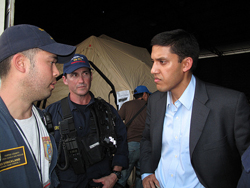

 This past Friday at the National Press Club, USAID Administrator Rajiv Shah laid out his hopes for the transformation of USAID into a stronger, more entrepreneurial and cooperative agency, one better able to meet the modern challenges that require the United States to play a bigger role in international development. Emphasizing that “America’s greatest security challenges are no longer just state-based,” he reminded the audience that “extreme poverty compromises basic human dignities, banishes hope for the future and paves the way for the rise of transnational extremism.” In order to meet the increased humanitarian and national security demands for development assistance, Shah said that USAID must reform to be more efficient with its spending, and increase communication and cooperation with other public, nonprofit, and private sector development groups. In refocusing the agency’s efforts to fewer programs in each country, Dr. Shah seeks to avoid spreading funding too thin, and to make sure that America’s efforts are devoted to significant successes in the most important programs. Taking a cue from the private sector, USAID will also make it a priority to evaluate all their programs for achievements, and demand quantifiable results for the money they put into each.
This past Friday at the National Press Club, USAID Administrator Rajiv Shah laid out his hopes for the transformation of USAID into a stronger, more entrepreneurial and cooperative agency, one better able to meet the modern challenges that require the United States to play a bigger role in international development. Emphasizing that “America’s greatest security challenges are no longer just state-based,” he reminded the audience that “extreme poverty compromises basic human dignities, banishes hope for the future and paves the way for the rise of transnational extremism.” In order to meet the increased humanitarian and national security demands for development assistance, Shah said that USAID must reform to be more efficient with its spending, and increase communication and cooperation with other public, nonprofit, and private sector development groups. In refocusing the agency’s efforts to fewer programs in each country, Dr. Shah seeks to avoid spreading funding too thin, and to make sure that America’s efforts are devoted to significant successes in the most important programs. Taking a cue from the private sector, USAID will also make it a priority to evaluate all their programs for achievements, and demand quantifiable results for the money they put into each.
Shah cited USAID’s response to the recent disaster in Haiti as an example of the rising entrepreneurial spirit in their agency. USAID looked for innovative ways to help Haitians in the immediate aftermath of the earthquake, when the normal channels for requesting and receiving resources for humanitarian aid were proving cumbersome. The Agency purchased local food stockpiles, for example, and distributed as much as they could get immediately, eliminating the waiting time for official food assistance to arrive from the US. They also partnered closely with the military to restore the Port-au-Prince airport and operate it at three times its standard capacity, to get food and other supplies on the ground and distributed across the country in record time. As a result, USAID and the World Food Program were together able to feed 3.5 million Haitians, and the United States ensured that over one million received vaccinations. Now, months later, USAID continues to work in Haiti and has made it a priority to operate jointly with locals (like water truck drivers who distribute chlorine tablets for them as they deliver water, helping cut diarrheal diseases by 12%) and NGOs (like the Gates Foundation, with whom they are teaching Haitians how to use cell phones to effectively manage their financials and develop businesses).
Shah’s reform efforts match the ever-increasing need to efficiently and innovatively meet challenges around the world, both for humanitarian recovery and for stabilizing communities as a matter of national security. With these reforms and continued support for the President’s Feed the Future and global health initiative, the United States could move back on target to meet the Millennium Development Goals, which include halving the worldwide total of hungry people.